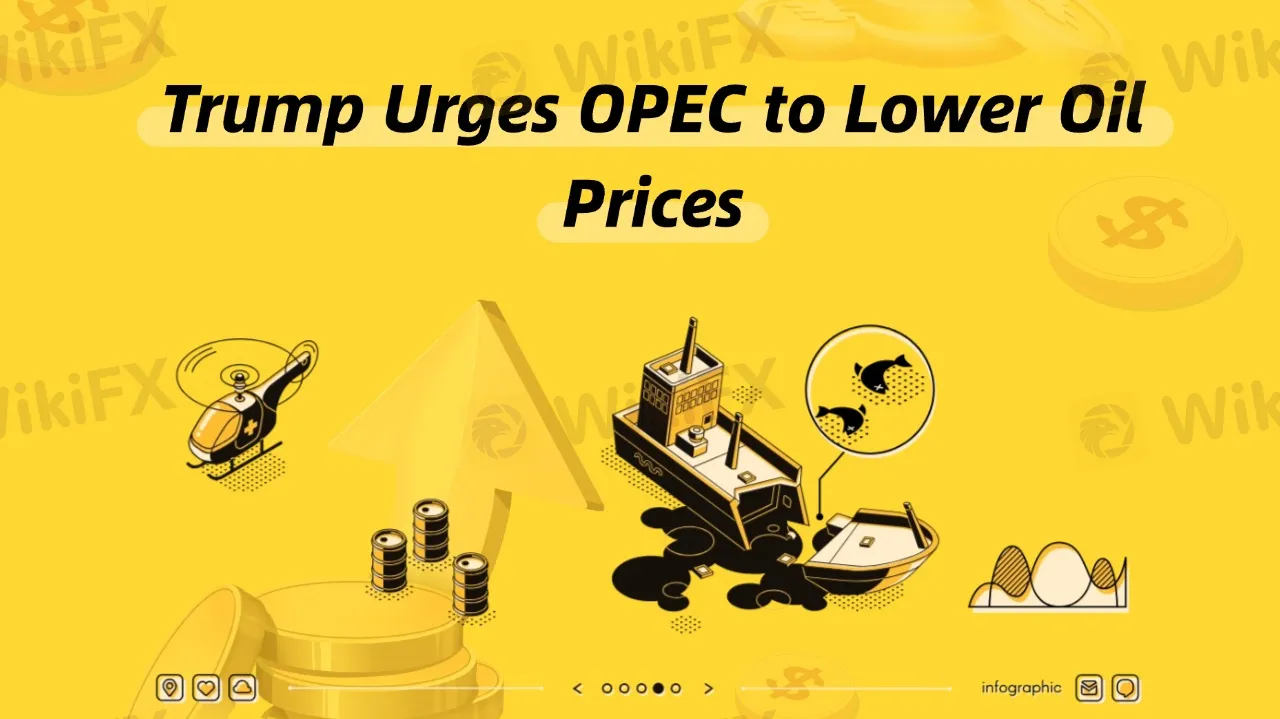简体中文
繁體中文
English
Pусский
日本語
ภาษาไทย
Tiếng Việt
Bahasa Indonesia
Español
हिन्दी
Filippiiniläinen
Français
Deutsch
Português
Türkçe
한국어
العربية
Trump Urges OPEC to Lower Oil Prices
Abstract:As of January 17, the EIA's oil status report showed that crude oil inventories have decreased for the ninth consecutive week, while Trump has urged OPEC to reduce oil costs.

Against the backdrop of fluctuating global oil prices, Trump recently issued a strong call to the Organization of Petroleum Exporting Countries (OPEC) to “lower oil costs.” He stated plans to intervene in the global oil market on a large scale and specifically urged OPEC member countries, including Saudi Arabia, to take measures to reduce oil prices. Trump believes that lowering oil prices will put pressure on Russia, which could lead to the end of the Ukraine conflict. At the same time, he argued that falling oil prices would help alleviate global inflation pressures and create conditions for lowering interest rates. Trump explicitly stated, “As oil prices fall, I will demand an immediate reduction in interest rates, and global interest rates should also decrease.”
Trump's remarks not only exert pressure on OPEC countries but also directly challenge the Federal Reserve's interest rate decisions. He publicly stated that he understands interest rates better than Federal Reserve Chairman Jerome Powell and predicted he would have a conversation with Powell at an appropriate time.
His comments had an immediate impact on the international oil market, with US WTI crude prices briefly dropping by 1.4% and Brent crude declining by 1.2%.
How will OPEC respond?
In response to Trump's call, OPEC's reaction may not be straightforward. As a key global oil-producing group, OPEC members have significant influence over oil price setting and production regulation. However, Trump's intervention may put these countries in a position where they need to weigh complex political and economic factors. Whether OPEC countries will respond to Trump's request largely depends on the global oil market's supply and demand situation and each country's economic interests. If OPEC decides to increase production further, it may lower oil prices in the short term, but it could also impact the fiscal revenues of its member countries, particularly those heavily reliant on oil exports.
Furthermore, OPEC is not fully unified, as some members may prefer to maintain higher oil prices, while others may support increasing production to meet global demand. While Trump's call is clear, OPEC's decision-making process will likely continue to be influenced by complex geopolitical and economic factors. Therefore, whether Trump's request can directly alter OPEC's production decisions remains to be seen.
For investors, keeping a close eye on OPEC and the Trump administration's developments will be crucial in understanding the future direction of oil prices.

Disclaimer:
The views in this article only represent the author's personal views, and do not constitute investment advice on this platform. This platform does not guarantee the accuracy, completeness and timeliness of the information in the article, and will not be liable for any loss caused by the use of or reliance on the information in the article.
Read more

Never Heard of Dynasty Trade? Here's Why You Should Be Worried
Have you heard this name before? No , it’s time you do because staying unaware could cost you. This platform is currently active in the forex trading and has been linked to several suspicious activities. Even if you’ve never dealt with it directly, there’s a chance it could reach out to you through ads, calls, messages, or social media. That’s why it’s important to know the red flags in advance.

WEEKLY SCAM BROKERS LIST IS OUT! Check it now
If you missed this week's fraud brokers list and are finding it difficult to track them one by one — don’t worry! We’ve brought together all the scam brokers you need to avoid, all in one place. Check this list now to stay alert and protect yourself from fraudulent brokers.

Catch the Latest Update on BotBro & Lavish Chaudhary
BotBro, an AI-based trading platform, became popular in India in 2024—but for negative reasons. Its founder, Lavish Chaudhary, who gained a huge following by promoting it heavily on social media. Since then, he has become well-known, but for many controversies. Let’s know the latest update about Botbro & Lavish Chaudhary.

Trading Other People’s Money | What Prop Firms Don’t Tell You
Proprietary (prop) trading firms have become increasingly popular. They give traders the chance to trade with larger amounts of money without risking their own savings. For many, this sounds like the perfect opportunity to grow faster and earn more. But while the benefits are appealing, there are also risks and hidden rules that traders must understand before joining a prop firm.
WikiFX Broker
Latest News
WEEKLY SCAM BROKERS LIST IS OUT! Check it now
Apex Trader Funding is an Unregulated Firm | You Must Know the Risks
What WikiFX Found When It Looked Into Aron Markets
Textiles to whisky: U.K.–India 'historic' deal is set to boost bilateral trade by over $34 billion a year
Thailand-Cambodia border clashes: Cambodia's economy has more to lose, analysts say
Puma shares plunge 18% after full-year sales, profit outlook cut on U.S. tariffs
Is Your Forex Strategy Failing? Here’s When to Change
FSMA Warns That Some Firms Operate as Pyramid Schemes
Federal Reserve likely to hold interest rates steady despite pressure from Trump. Here's what that means for your money
Sigma-One Capital Scam? Investors Say They Can’t Withdraw Funds
Currency Calculator


